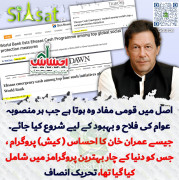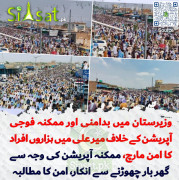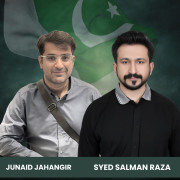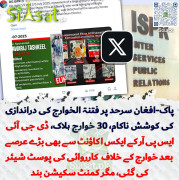کراچی کی یادیں - ڈاکٹر اے کے خان
Dr A Q Khan Monday, May 28, 2012

Last week I went to my old, memorable city, Karachi once a beautiful city, a city of lights, a peaceful city, a city of entertainment and a city of fun. I migrated from the beautiful Bhopal state in India, via Chittorgarh, Ajmer, Loni, Barhmer, Munabao, Kokhrapar, Mirpur Khas and Hyderabad. Reaching Karachi was like entering an oasis. Karachi was not only beautiful, it was also clean and green. I immediately enrolled in D J Sindh Government College, the best in Pakistan at the time, where we had competent, warm-hearted teachers (Prof A L Shaikh, Prof Ansari, Prof Kamali, Prof DSouza, Prof Sidhwa, Prof Azhar, Prof Obaidur Rahman Khan, Prof A Rasheed, Prof Zaidi, and others). After getting the BSc degree, I became government inspector of weights and measures, which provided me with an opportunity to visit every corner of the city.
The nine years I spent in Karachi were memorable ones. The population was only three million at the time. The roads were clean and law and order ruled. There was no snatching of possessions you carried (as mobile phones are snatched these days), and no carjacking or theft of motorbikes. Food was delicious and unadulterated, and the one thing that really stands out in my mind was the abundance of fruit everywhere. It was August when I came (I crossed into Pakistan on 14th August) and high season for all kinds of fruit. In Bhopal we could only get apples and grapes from Kashmir (rather expensive). In Karachi there was Sundarkhani (8 annas a kilo, or 50 paisas in todays terms), naag (4 annas/kilo) and Qandhari pomegranates (8 annas kilo). Surmai fish was available at 12 annas/kilo and lobster for 4 annas per piece. The quantities of grapes, apples, apricots and pomegranates I ate in those first few months I later did not consume in years. There was a small restaurant in a lane in the Pakistan Chowk area. I used to go there during my lunch break and have a plate of delicious, sweetish stew and two hot chappatis, all for four annas.
To this day I remember that flavour. Not far from Pakistan Chowk, Gama Pehelwan used to live, and then Bholu Pehelwan and Gama Pehelwans other sons. Not far from there was the General Post Office (GPO), which at that time was a single-storey building with a large lawn. Another place to visit in that area was the meticulously maintained Burns Gardens, an extremely beautiful spot in those days.
There was a good public transport system at the time. Ehsan Transport and Gujrat Bus Service were running clean and comfortable buses throughout the city. Even better were the express buses run by the Karachi Road Transport Co. Trams operated by the Mohammed Ali Tramway Co. (fare: 1 anna) ran from Saddar to Keanari and from Chakiwara to Bolton Market. Later on, because the trams going to Keamari used the Native Jetty bridge, the service to the port became once-a-week, on Sundays, for the protection of the bridge. Trams also reached the Cantonment Railway Station. A Vespa scooter could be bought for Rs2,000 and a small car for Rs4,000 to 5,000. Tea and brown peras at the Iranian restaurants were delicious and Zelins Coffee House at the corner of Bunder Road and Victoria Road offered excellent cold coffee and chicken patties. For biryani, qorma and naan I went to Cafe George and I still remember the most delicious coconut pastries at Cafe Grand, just opposite Metropole Hotel.
Then there was Burns Road, known all over Karachi for its food. At that time it was the centre of nahari shops, and of seekh kababs, haleem and qorma. The education system was excellent at the time and had not yet been commercialised. No cheating took place and never once was any paper postponed. There was very little unemployment. We were proud of our green passports and did not need visas for European countries. I had never heard of loadshedding. Justice was quick and cheap. The local Makranis were an extremely jolly and fun-loving people while the Sindhis were friendly and soft-spoken. This is the Karachi of my memories. Now it has been taken over by extortionists, murderers, kidnappers and rapists.
Today unemployment and loadshedding are rife. People have no feelings for each other any more. When they hear gunfire or an explosion, they look as little moved as if a plane had just flown over in the sky. My family and some dear friends still live in Karachi. My sister, with whom I stay when I visit the city, lives in Mohammad Ali Housing Society. From the moment I enter her house there is a steady stream of visitors. Allah has been kind to my sister and her table is always laden with Bhopali and Hyderabadi dishes for everyone to enjoy.
During my last visit, two important events took place. The first was the heart-warming function arranged by the Rehnuma-e Pakistan Forum. Former chief justice Saeeduzzaman Siddiqui is chairman of this organisation. It has a large number of eminent industrialists, intellectuals and scholars. Needless to say, these are billionaires we are talking about, yet they wear simple safari suits and shalwar-kurtas. I was chief guest at this particular function and they all requested me to become the patron of the organisation. I told them not to bother about any formal title, that I will do everything within my means to support their aims and objectives. Theirs is a noble cause, not only for the people of Karachi but for all Pakistanis to bring about a peaceful, quick revolution to save the sinking ship we call Pakistan. It is extremely important that we elect competent technocrats and industrialists in order to put our country on the road to recovery and progress. Politicians are self-centred, at the very least. Those in power are corrupt and incompetent and are working on a one-point agenda-loot and run away.
The second important event was my visit to Nazeer Hussain University in Federal B Area. The standard of construction is very good, with spacious classrooms, laboratories and halls. Because of my extensive experience I was able to give some tips which the architect had overlooked. All modern subjects (architecture, electronics, electrical engineering, business management and information technology) are to be taught. I advised them to include mechanical engineering and process technology, two very important disciplines nowadays.
With donations from philanthropists it was possible for me to have a state-of-the-art Institute of Biotechnology and Genetic Engineering constructed, which was then donated to the University of Karachi to run for the benefit of the children of Karachi. Similarly, a Mental Health Clinic is functioning to alleviate the maladies of thousands of Karachi residents.
Dr A Q Khan Monday, May 28, 2012

Last week I went to my old, memorable city, Karachi once a beautiful city, a city of lights, a peaceful city, a city of entertainment and a city of fun. I migrated from the beautiful Bhopal state in India, via Chittorgarh, Ajmer, Loni, Barhmer, Munabao, Kokhrapar, Mirpur Khas and Hyderabad. Reaching Karachi was like entering an oasis. Karachi was not only beautiful, it was also clean and green. I immediately enrolled in D J Sindh Government College, the best in Pakistan at the time, where we had competent, warm-hearted teachers (Prof A L Shaikh, Prof Ansari, Prof Kamali, Prof DSouza, Prof Sidhwa, Prof Azhar, Prof Obaidur Rahman Khan, Prof A Rasheed, Prof Zaidi, and others). After getting the BSc degree, I became government inspector of weights and measures, which provided me with an opportunity to visit every corner of the city.
The nine years I spent in Karachi were memorable ones. The population was only three million at the time. The roads were clean and law and order ruled. There was no snatching of possessions you carried (as mobile phones are snatched these days), and no carjacking or theft of motorbikes. Food was delicious and unadulterated, and the one thing that really stands out in my mind was the abundance of fruit everywhere. It was August when I came (I crossed into Pakistan on 14th August) and high season for all kinds of fruit. In Bhopal we could only get apples and grapes from Kashmir (rather expensive). In Karachi there was Sundarkhani (8 annas a kilo, or 50 paisas in todays terms), naag (4 annas/kilo) and Qandhari pomegranates (8 annas kilo). Surmai fish was available at 12 annas/kilo and lobster for 4 annas per piece. The quantities of grapes, apples, apricots and pomegranates I ate in those first few months I later did not consume in years. There was a small restaurant in a lane in the Pakistan Chowk area. I used to go there during my lunch break and have a plate of delicious, sweetish stew and two hot chappatis, all for four annas.
To this day I remember that flavour. Not far from Pakistan Chowk, Gama Pehelwan used to live, and then Bholu Pehelwan and Gama Pehelwans other sons. Not far from there was the General Post Office (GPO), which at that time was a single-storey building with a large lawn. Another place to visit in that area was the meticulously maintained Burns Gardens, an extremely beautiful spot in those days.
There was a good public transport system at the time. Ehsan Transport and Gujrat Bus Service were running clean and comfortable buses throughout the city. Even better were the express buses run by the Karachi Road Transport Co. Trams operated by the Mohammed Ali Tramway Co. (fare: 1 anna) ran from Saddar to Keanari and from Chakiwara to Bolton Market. Later on, because the trams going to Keamari used the Native Jetty bridge, the service to the port became once-a-week, on Sundays, for the protection of the bridge. Trams also reached the Cantonment Railway Station. A Vespa scooter could be bought for Rs2,000 and a small car for Rs4,000 to 5,000. Tea and brown peras at the Iranian restaurants were delicious and Zelins Coffee House at the corner of Bunder Road and Victoria Road offered excellent cold coffee and chicken patties. For biryani, qorma and naan I went to Cafe George and I still remember the most delicious coconut pastries at Cafe Grand, just opposite Metropole Hotel.
Then there was Burns Road, known all over Karachi for its food. At that time it was the centre of nahari shops, and of seekh kababs, haleem and qorma. The education system was excellent at the time and had not yet been commercialised. No cheating took place and never once was any paper postponed. There was very little unemployment. We were proud of our green passports and did not need visas for European countries. I had never heard of loadshedding. Justice was quick and cheap. The local Makranis were an extremely jolly and fun-loving people while the Sindhis were friendly and soft-spoken. This is the Karachi of my memories. Now it has been taken over by extortionists, murderers, kidnappers and rapists.
Today unemployment and loadshedding are rife. People have no feelings for each other any more. When they hear gunfire or an explosion, they look as little moved as if a plane had just flown over in the sky. My family and some dear friends still live in Karachi. My sister, with whom I stay when I visit the city, lives in Mohammad Ali Housing Society. From the moment I enter her house there is a steady stream of visitors. Allah has been kind to my sister and her table is always laden with Bhopali and Hyderabadi dishes for everyone to enjoy.
During my last visit, two important events took place. The first was the heart-warming function arranged by the Rehnuma-e Pakistan Forum. Former chief justice Saeeduzzaman Siddiqui is chairman of this organisation. It has a large number of eminent industrialists, intellectuals and scholars. Needless to say, these are billionaires we are talking about, yet they wear simple safari suits and shalwar-kurtas. I was chief guest at this particular function and they all requested me to become the patron of the organisation. I told them not to bother about any formal title, that I will do everything within my means to support their aims and objectives. Theirs is a noble cause, not only for the people of Karachi but for all Pakistanis to bring about a peaceful, quick revolution to save the sinking ship we call Pakistan. It is extremely important that we elect competent technocrats and industrialists in order to put our country on the road to recovery and progress. Politicians are self-centred, at the very least. Those in power are corrupt and incompetent and are working on a one-point agenda-loot and run away.
The second important event was my visit to Nazeer Hussain University in Federal B Area. The standard of construction is very good, with spacious classrooms, laboratories and halls. Because of my extensive experience I was able to give some tips which the architect had overlooked. All modern subjects (architecture, electronics, electrical engineering, business management and information technology) are to be taught. I advised them to include mechanical engineering and process technology, two very important disciplines nowadays.
With donations from philanthropists it was possible for me to have a state-of-the-art Institute of Biotechnology and Genetic Engineering constructed, which was then donated to the University of Karachi to run for the benefit of the children of Karachi. Similarly, a Mental Health Clinic is functioning to alleviate the maladies of thousands of Karachi residents.
Last edited by a moderator:


































